U.S. Seen Favorably, Pakistan Unfavorably
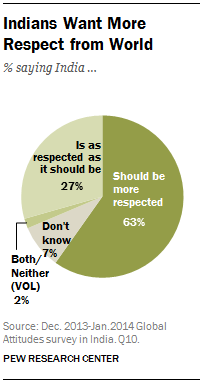
India has growing influence around the world and is expected to be the most populous country and the third largest economy in the world by 2050. And it is already a dominant regional power. Nevertheless, many Indians feel they lack respect abroad. They are concerned about China’s power, influence and territorial claims. They have mixed sentiments about the United States. They generally like America and see it as the world’s leading economic power. They have confidence in President Barack Obama, but they are not so sure about his international policies or the trajectory of U.S.-India relations. Their relationship with Pakistan remains troubled. And they feel threatened by Islamic extremism.
Indians are frustrated that their country does not receive sufficient recognition on the world stage. By more than two-to-one (63% to 27%), they say that India should be more respected around the globe than it is. This sense that foreigners do not give India its due is widely shared by men and women, rich and poor, highly educated and less well educated, people who live in cities and those who live in the countryside. It is a sentiment that is not unique to India. More than half of the Chinese (56%) think their country should be more respected, according to a Pew Research Center survey in spring 2013.
Indians view the world as a dangerous place. Two-thirds (67%) of the public see Islamic extremist groups as a major threat to India. This concern is widely shared across demographic groups, although it is felt most intensely in the eastern states (79%).
Nearly six-in-ten (59%) say political instability in Pakistan is a major threat. People with at least some college education (68%) or a high income (63%) are more likely than those with a primary education or less (56%) or a low income (53%) to be worried about the stability of India’s neighbor.
A majority of Indians (56%) also view the power and influence of China as a major threat to India. Men (60%) are more concerned than women (51%).
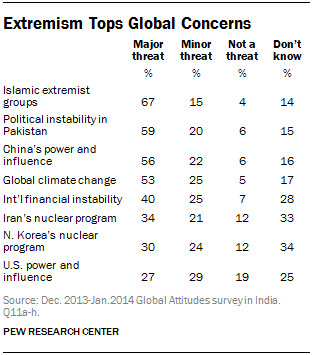
India is now the third largest source of total carbon emissions, trailing only China and the United States. And Indians understand this is a problem. About half (53%) of the public express the view that climate change is a major hazard for their country. This is a particular concern of people in eastern India (74%). By comparison, in the Pew Research poll conducted in spring 2013, only 40% of Americans and 39% of Chinese considered climate change a major threat.
Four-in-ten Indians worry that international financial instability poses a major danger to the nation. Well-educated Indians (54%) are more concerned than those with a minimal education (36%). Indians in the eastern part of the country (49%) are more troubled than those in the north (33%).
The Indian public is not that anxious about the nuclear programs being pursued by Iran and North Korea. Only about a third (34%) voice concern about Tehran’s nuclear efforts. But a similar proportion (33%) has no opinion. And just 30% say Pyongyang’s nuclear ambitions are a major threat, with another third (34%) taking no stance on the issue.
Meanwhile, just 27% of the Indian public sees American power and influence as a major threat to India.
Indians See U.S. Favorably
In general, Indians are positively disposed toward the United States. A majority (56%) say they have a favorable view of America, including 30% who express a very positive opinion. The intensity of this support is notable. By five-to-one Indians are more likely to have a very favorable view than to hold a very unfavorable sentiment (6%).
Those with at least some college education (73%) and high-income Indians (64%) are particularly affirmative toward the United States. But half of those with a primary education or less (52%) and low-income Indians (50%) also give Uncle Sam a thumbs up. People who live in the south of India (76%) are far more predisposed toward the United States than those who live in the north (36%), where 47% voiced no opinion. Overall, just 15% of the Indian public have an unfavorable opinion of America.
As a point of comparison, 58% of the British and 53% of Germans had a favorable view of the United States in a spring 2013 Pew Research Center survey, but just 40% of Chinese held such positive views of America and only 11% of Pakistanis.
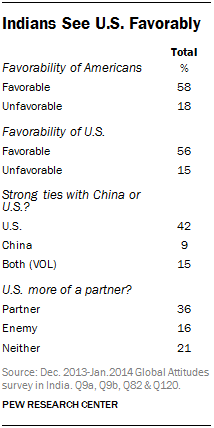
Nearly six-in-ten Indians have a positive view of the American people (58%). Here, too, this view is shared by both rich and poor, the well educated and the less educated. Indians are also more than twice as likely to see the United States as a partner (36%) than as an enemy (16%). Notably, a solid majority of people in the south of India (56%) say America is India’s partner. But two-in-ten (21%) nationwide say the U.S. is neither a partner nor an enemy. And one-in-four (26%) have no opinion.
Seeing America as a partner, Indians say U.S. policies favor India rather than Pakistan by a ratio of three-to-one (36% to 12%). An additional 22% say Washington policy on the subcontinent fairly balances between Islamabad and Delhi. Notably, 30% have no opinion of which country America sides with in Indo-Pakistani relations.
Another reason Indians’ views of the United States are relatively positive may be that they do not see Washington as acting unilaterally in foreign policy. More than half the public (56%) express the opinion that the United States takes into account the interests of countries like India in making international policy decisions. High-income Indians (65%) and people who live in urban areas (61%) are more likely to hold such views than those with low incomes (51%) and people living in rural areas (53%). In contrast, 57% of the British think Uncle Sam acts unilaterally in foreign affairs, according to the spring 2013 Pew Research Center survey, as did 53% of the Pakistanis.
In the wake of recent revelations of spying by the U.S. National Security Agency, four-in-ten Indians (41%) say the United States respects the personal freedoms of its people. Two-in-ten (19%) venture it does not. And a large segment of the population, four-in-ten (40%), voices no opinion. Those with some college or more (59%) are much more likely to see Uncle Sam as a stalwart of human rights than are those with a primary education or less (37%).
In comparison, only 25% of the Indian public sees China as respecting personal freedoms. Just 22% voice the belief that Iran protects civil liberties. And only 19% say Saudi Arabia does. Many Indians simply have no view on this issue.
Indians are divided over whether relations between Washington and New Delhi have gotten better in recent years. Roughly four-in-ten (39%) say ties have improved. But a third (34%) say they have not picked up. And a quarter (26%) voice no opinion. Well-educated Indians (55%), high-income people (47%) and those who live in urban areas (47%) are more likely than low-income individuals (34%), those with a primary education or less (35%) and persons living in the countryside (35%) to see U.S.-India ties on the upswing.
Indians overwhelmingly say that the United States (47%) is the world’s leading economic power, rather than China (12%), Japan (9%) or the countries of the European Union (2%). This opinion of American economic preeminence is widely shared among rich and poor, highly educated and less educated, urban and rural Indians and is particularly strong in eastern India (61%).
However, Indians are less certain about U.S. preeminence in the long run. Just 21% think China will never supplant the United States as the world’s leading superpower, both economic and strategic. A plurality (46%) express no view on this subject, while 12% say China already has surpassed the United States and 21% say Beijing will one day replace Washington. Notably, 44% of Indians with some college or more say China has already replaced or will eventually replace the United States as the world’s leading superpower. Just 31% of Indians with a primary education or less hold such views.
More Restrained View of Obama
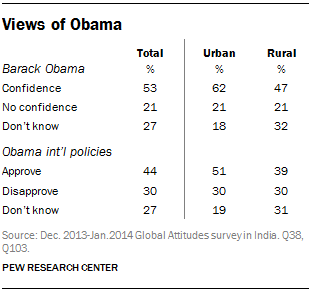
Indians have a positive, if somewhat nuanced, view of U.S. President Barack Obama. Roughly half (53%) say they have a lot or some confidence in him to do the right thing in world affairs. This trust is particularly strong among high-income Indians (66%) and men (58%). But 27% express no opinion about the U.S. leader. And only 19% of the Indian public says they have a lot of confidence in the American president, while 34% say they have some confidence.
In spring 2013, 88% of Germans had confidence in Obama to do the right thing in foreign affairs, as did 72% of the British, but only 31% of the Chinese and just 10% of the Pakistanis.
Less than half (44%) of Indians approve of Obama’s international policies. As with many issues relating to the United States, approval is highest among the wealthiest, the best educated and people who live in urban areas. And roughly a quarter of the public has no view on the American president’s foreign policy. Half (50%) of people 50 years of age and older approve, but 36% of those ages 18 to 29 disapprove.
Indians are even more divided over one of the signature anti-terrorism policies of the Obama administration: U.S. missile strikes from pilotless aircraft called drones that have targeted extremists in Pakistan, Yemen and Somalia. Just 30% approve of them, 38% disapprove and 32% have no opinion. Indians are not alone in their questioning of drone strikes. Only 39% of the British, 25% of the Japanese, 23% of the Chinese and 5% of Pakistanis back them.
Skepticism about China
Indians are far more skeptical about their neighbor China. A little more than a third of the public has a favorable view of China (35%), with only 13% holding a very favorable opinion. Four-in-ten (41%) have an unfavorable opinion of the People’s Republic, including 22% whose opinion is very unfavorable. Half of high-income Indians (51%) have a negative view.
More than a third (37%) of the Indian public considers China to be an enemy. Just 21% see China as a partner, and 24% voice no opinion.
One reason for such sentiment may be that nearly two-thirds of the public (65%) view China’s growing military power as a bad thing for India. Men (71%), in particular, are concerned, as are those who live in the south (83%). Only 19% of the Indian public say Beijing’s increasing military might is good for India.
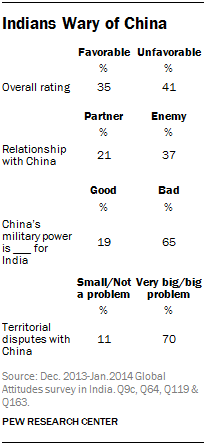
India has long had border disputes with China. A war was fought along their mutual frontier in 1962. And, in recent years, there have been confrontations along the Chinese border with Jammu and Kashmir and in Arunachal Pradesh, an Indian state that China claims as part of Tibet. So it comes as little surprise that seven-in-ten Indians say territorial disputes between India and China are a problem for the country. This includes 45% who say they are a very big problem. Again, men (74%) are especially troubled by China’s territorial ambitions. Just 11% say these territorial frictions are not a problem for India.
Nevertheless, a plurality of Indians (47%) hold the view that China takes into account the interests of countries like India when making international policy decisions. Urban dwellers (55%) are more likely than rural residents (42%) to hold such opinions. Just 28% say China acts unilaterally. But a quarter of Indians (26%) have no views on the issue. On this topic, Indians appear more trusting of China than some others. Only 9% of Japanese and 35% of Americans think Beijing’s foreign policy takes into account the views of others.
With Indians holding the opinions they do about China and the United States, it may come as no surprise that 42% of them say it is more important to have strong ties with Washington than with Beijing. Only 9% hold the view that it would be better to have a closer relationship with China. And 15% of the public volunteer that India should be closer to both countries. But, in a sign that superpower politics are a distant concern for many Indians, 28% have no opinion on the matter.
Across the Board: Indians Favor U.S. vs. China
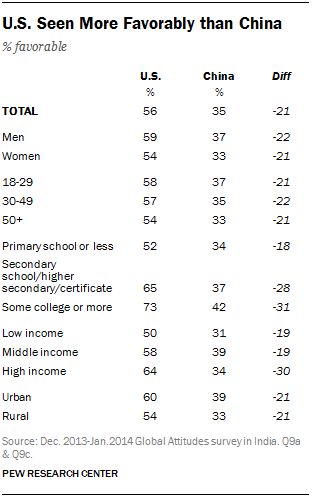
Indians of all backgrounds have a more favorable view of the United States than of China. More than half of both men and women see America in a positive light compared with only about a third who see China that way. There is no generation gap with regard to views on the U.S. and on China; all age groups favor America. More than seven-in-ten Indians (73%) with some college or more have an affirmative view of Uncle Sam, compared with just four-in-ten (42%) college attendees who see the People’s Republic in that light. Similarly nearly two-thirds of high-income Indians (64%) favor the United States compared with one-third (34%) who state a positive opinion of China. And while half of rural Indians (54%) hold a favorable estimation of America, only a third (33%) say that about China.
Uncertainty about Other Global Players
Indian assessments of other countries are marked by the large proportion of the public that has no view, either favorable or unfavorable, of key countries.
Among the other nations tested in the survey, by a two-to-one ratio Indians see Japan favorably: 49% favorable, 25% unfavorable and 26% no opinion. Southerners (72%), well-educated Indians (65%), men (56%) are particularly well disposed toward the Land of the Rising Sun.
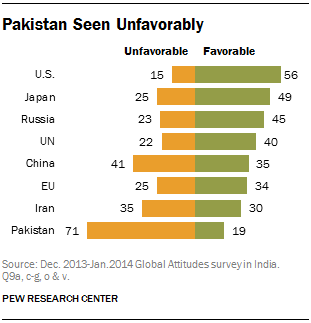
Russia, a strong ally of India during the Cold War, enjoys a 45% favorable rating, with 23% of the public holding an unfavorable view and 32% having no judgment (The Pew Research Center survey was conducted before Russia’s annexation of Crimea). Russia’s greatest support is among Indians with some college education (62%), and eastern (59%) and southern (59%) Indians. Men (52%) also have a more favorable view than women (38%, with 40% of women having no view).
The European Union, with which India has been unsuccessfully negotiating a free trade agreement since 2007, is viewed positively by just a third of Indians (34%), with a quarter (25%) having an unfavorable perception and four-in-ten (40%) voicing no opinion.
Iran is even less popular among Indians. Just 30% have a favorable judgment of the Islamic state, while 35% have an unfavorable view and 36% express no judgment. Men (39% unfavorable) are more critical than women (29% unfavorable).
A founding member of the United Nations, India has long campaigned to be a member of the UN Security Council. But just 40% of the public has a favorable assessment of the international body, 22% are unfavorably disposed toward the UN and 38% have no view. Indians with some college education or more (54%) and high-income people (46%) are more likely to have a positive take on the UN than are people with a primary education or less (37%) and low-income Indians (36%).
Negative Views toward Pakistan
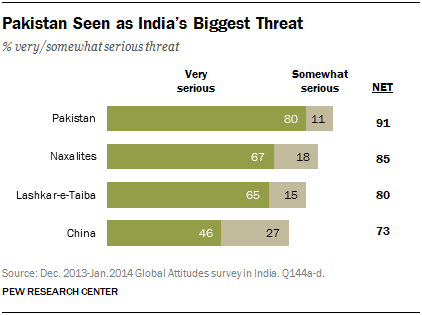
Indians are the least favorably disposed toward their neighbor Pakistan, among the nations tested in the survey. Just 19% of the public has a favorable view of their long-time adversary, and 71% have an unfavorable opinion, including 54% who have a very unfavorable assessment. The negative view of Pakistan, a country with which India has fought four wars since 1947, is shared across demographic groups.
Pakistan is seen as a greater danger to India than any of the other potential dangers included on the poll. Eight-in-ten Indians consider Pakistan a very serious threat to the county. About two-thirds feel this way about the Naxalites (Maoist insurgency groups active in East and South India) and Lashkar-e-Taiba (an extremist organization widely blamed for the 2008 Mumbai terrorist attacks). Slightly less than half of Indians (46%) see China as a serious threat.
When asked which of these poses the greatest threat to India, a 47% plurality name Pakistan. About one-in-five say Lashkar-e-Taiba (20%) or the Naxalites (19%). Only 6% believe China poses the greatest danger.
Many Indians are concerned about the possibility of Pakistan’s falling into the hands of extremists. Roughly six-in-ten (62%) are worried that such groups could take control of Pakistan, and 35% are very worried. Pakistani influence in Afghanistan is also a concern for many – 72% say this is a big problem, and 52% rate it a very big problem.
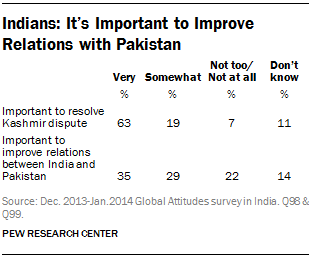
Despite these concerns and the long-running tensions between the two countries, most Indians want a better bilateral relationship. About a third (35%) believes improving relations with Pakistan is very important, while an additional 29% say this is somewhat important.
There is an even stronger desire to settle the dispute over Kashmir, which has caused friction between the two nations since the end of British rule. A sold majority (63%) considers resolving the dispute a very important priority.
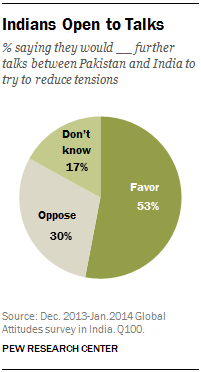
On balance, Indians also want a stronger economic relationship with Pakistan: 54% say increased trade and business ties between the two countries would be good for India, while just 32% think this would be a bad thing.
And Indians tend to support more dialogue with Pakistan. Roughly half (53%) favor further talks with Pakistan to reduce bilateral tensions; only 30% oppose this idea.




